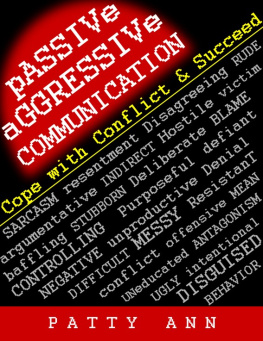

FIRESIDE
Rockefeller Center
1230 Avenue of the Americas
New York, New York 10020
www.SimonandSchuster.com
Copyright 1992 by Scott Wetzler, Ph.D.
All rights reserved
including the right of reproduction
in whole or in part in any form.
First Fireside Edition 1993
FIRESIDE and colophon are registered trademarks
of Simon & Schuster Inc.
Designed by Irving Perkins Associates
Manufactured in the United States of America
20 19
Library of Congress Cataloging-in-Publication Data
Wetzler, Scott, date.
Living with the passive-aggressive man: coping with the personality syndrome of hidden aggressionfrom the bedroom to the boardroom / Scott Wetzler.
p. cm.
Includes index.
1. MenUnited StatesPsychology. 2. Passive-aggressive
personalityUnited States. 3. Man-woman relationsUnited States.
I. Title.
HQ1090.3.W48 1992
155.332dc20 92-14598
CIP
ISBN 0-671-76791-7
ISBN 0-671-87074-2 (pbk.)
eISBN-13: 978-1-45164-017-5
While the case studies described in this book are based on interviews with real persons, the names, professions, locations and other biographical details about the participants have been changed to preserve their privacy and anonymity.
To the memory of my father, Benjamin Wetzler
ACKNOWLEDGMENTS
A novice to the world of publishing, I have been extremely fortunate to be shepherded through the process by three talented professionals: Connie de Swaan, whose skillful use of language made the manuscript eminently more readable; Gail Winston of Simon & Schuster, whose editorial advice kept the book true to our initial vision; and Pam Bernstein of the William Morris Agency, who has consistently advocated on my behalf. I am indebted to all of you. In addition, Liz Perle deserves acknowledgment, as she was the first person to recognize the potential of a book on passive-aggressive men.
Several friends are worthy of special mention. My jogging partner, Tom Teicholz, served as a sounding board for all my ideas, read and reread countless drafts, and supported me with his usual good humor, creativity, and insights. David Richenthal, my attorney, was always available to help bring the project to fruition in any and every way. And Dr. Willard Gaylin, mentor and role model, whose intellect is surpassed by his compassion. I thank each one of you.
I am particularly grateful to Dr. Herman van Praag and the Department of Psychiatry at the Albert Einstein College of Medicine/Montefiore Medical Center, which has been my second home for many years, for giving me the time and intellectual stimulation to put my ideas down on paper.
I would like to express my appreciation to the many anonymous patients whose stories are told throughout this book.
And finally, to my wife, Graciela, I am fortunate to offer her my ever-increasing love and devotion.
CONTENTS
INTRODUCTION
As a practicing psychologist, many of the stories I hear women recount about certain men in their lives are strongly similar in detail. This is true whether they are talking about dating, marriage, family conflicts, dynamics on the job or superficial everyday encounters.
A number of patterns tend to pop up in their descriptions of relationships with boyfriends, husbands, fathers or bosses: many of these men unnerve them through convoluted power games, obstructive tactics and lopsided logic. There always seems to be a struggle involved, whether it is about intimacy, respect, success at work or even something as simple as ordering a meal from a waiter. If I let the guy know what I want, women patients have told me again and again, then he just makes it harder for me to get.
The frustrating and maddening behavior they are talking about actually has a method to it, and a name: passive-aggressionand passive-aggressive behavior is what drives these women crazy. What exactly are the men in their lives doing? How does passive-aggressive behavior play itself out? See if the following real-life incidents appear familiar to you.
Mark and Heather have been living together for a year, but lately Mark has been playing the accidental lover too often. Hell take his clothes off and lie back, giving Heather a look that indicates he wants sex. But shes never quite sure; Mark will neither resist her advances nor show much enthusiasm. Even while having sex, Heathers not sure if he cares about pleasing either one of them, or of being intimate. Ask him what he wants and hell say, You know. Ask Mark if he was satisfied, and he may answer by turning away from Heather, garbling a comment, stopping her dead from asking again, or countering with a remark such as, You always need compliments.
Afterglow turns into aftershock.
Jack, a vice president of marketing and a fairly popular man with some good ideas as well as higher aspirations, has been assigned to work with Nora, a colleague in an equal position. Jack prides himself on being the nerve center of his department, always telling clients and underlings that he runs things. But this is a belief he alone holds. Nora, a more taciturn personality, has become the driving force behind the success of the department since she arrived at the agency four months ago, a fact Jack cannot deal with.
Now that Jack and Nora must work together on a project for a major client, Nora discovers whos in charge: Jack neglects to give Nora some crucial phone messages; he makes appointments with the client without informing her; he spends most of his day trying to undermine Noras progress in getting a deal done with the client. Angry and frustrated, Nora takes Jack out for a drink and confronts him. Jack tells her that no one is more of a team player than me. The next morning, Jack complains to their boss that Nora is procrastinating in getting the deal done, that she misses appointments with the client, that theyre unhappy with her work and that she doesnt return their phone calls.
Janet has promised her retired parents to make a family dinner, since they rarely see each other except for major holidays. Eddie, her older brother, works long hours at a city newspaper; Janet runs her own mail-order business and has the added responsibility of being a single parent to her twin sons, so its been difficult to coordinate a good time for all of them.
Finally, Eddie agrees to a time and promises to make himself available. Janet plans a catered dinner and spends a lot of time and money getting it right. Eddie carries on about how he cant wait to see the family, and that of course hell be at Janets apartment by seven oclock, seven-thirty the latest. He calls at six to say hell be a half hour latebut its five hours later when he turns up, with no apology.
Janet blows up; their mother begins crying; their father makes accusations about Eddie being spoiled and selfish. Eddie doesnt understand why everyone is so angryhe just doesnt get it.
Eddie said hed gotten a call about covering what could be a front-page scandal for the paper and went off to meet a source. He thought his family should be happy for him, since it could mean a turning point in his career. Why cant they get off his back? What was one catered dinner compared to his successand besides,
Next page










